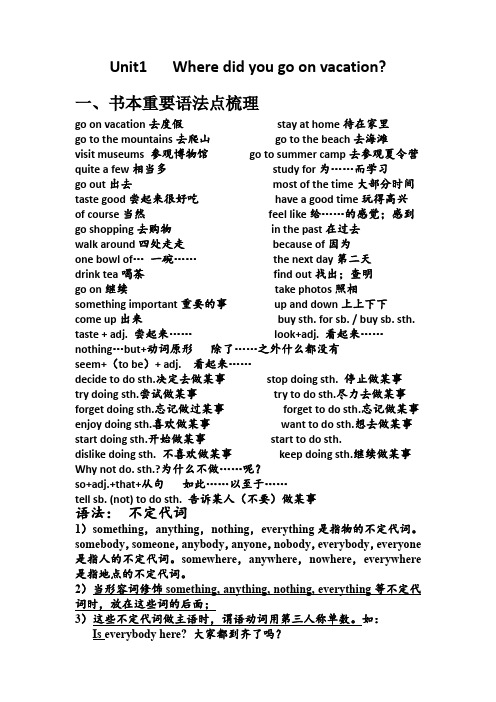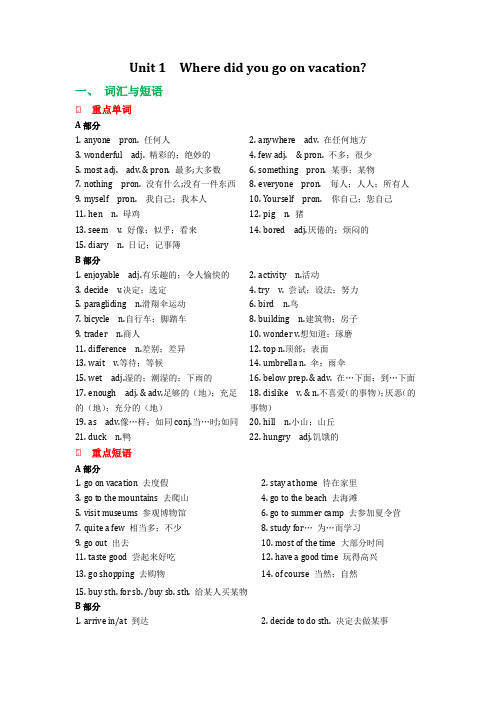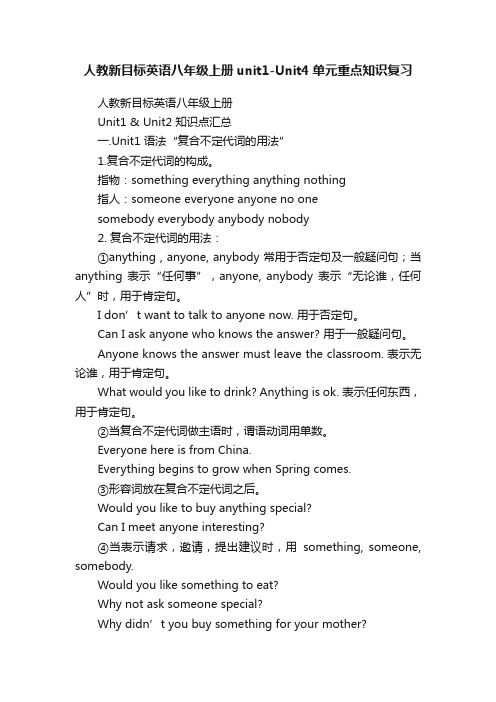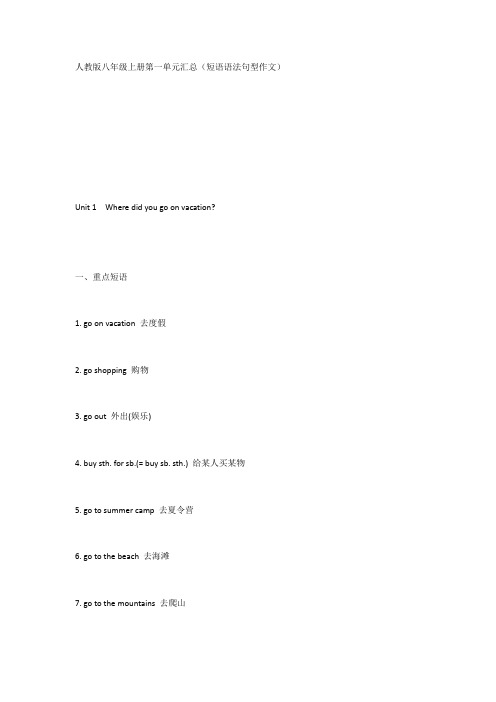人教版八年级英语上册第一单元复习资料
- 格式:doc
- 大小:56.04 KB
- 文档页数:8

人教版八年级上册英语知识点汇总资料Unit1 Where did you go on n?重点语法】不定代词:不指名代替任何特定名词或形容词的代词叫做不定代词。
用法注意:1.some和any +可数名/不可数名。
some多用于肯定句,any多用于否定句、疑问句和条件从句。
有些问句中用some,不用any,问话者XXX望得到对方肯定回答。
2.由some。
any。
no。
every与body。
one。
thing构成的复合不定代词作主语时,其谓语动词用三单。
3.不定代词若有定语修饰,该定语要置于其后:如:something interesting重点短语】1.buy XXX为某人买某物2.taste + adj.尝起来……3.nothing。
but + V.(原形)除了……之外什么都没有4.seem + (to be) + adj看起来5.XXX小地方到达某地6.XXX do sth.决定做某事7.XXX.尝试做某事/ try to do sth.尽力做某事8.XXX喜欢做某事9.want to do sth.想去做某事10.start XXX开始做某事=XXX.11.XXX停止做某事区分。
to do sth.停下来去做某事12.XXX XXX.不喜爱做某事14.so + adj + that +从句云云……以至于……16.tell sb。
(not) to do sth.告诉或人(不要)做某事17.keep XXX.连续做某事18.XXX.遗忘去做某事XXX遗忘做过某事词语辨析】1.XXX照相quite a few+名词复数“许多…”2.XXX形容词看起来…。
You seem happy today.XXX.好像XXX仿佛做某事I seem to have a coldIt seems +从句似乎。
….It XXX.seem like。
好像,似乎…。
It seems like a good idea.XXX小地点注:若后跟地点副词XXX,介词需省略,如:arrive here。

人教八上Unit 1 Where did you go on vacation重点词汇、词组及练习一、重点单词1. anyone prin. 任何人2. anywhere adv. 在任何地方3. wonderful adj. 精彩的;绝妙的4. enjoyable adj. 有乐趣的;令人愉快的5. most adj. , adv. & pron. 最多;大多数6. activity n. 活动7. nothing pron. 没有什么;没有一件东西8. bird n. 鸟9. try v. & n. 尝试;设法;努力10 decide v. 决定;选定11. hen n. 母鸡12. pig n. 猪13. seem v. 好像;似乎;看来14. bored adj. 厌倦的;烦闷的15. diary n. 日记;记事簿16. below prep. & adv. 在…….下面;到……下面17. bicycle n. 自行车;脚踏车18. building n. 建筑物;房子19. trader n. 商人20 wonder v. 想知道;琢磨21. difference n. 差别;差异22. hungry adj. 饥饿的23. wait v. 等待;等候24. umbrella n.伞;雨伞25. wet adj. 湿的;潮湿的;下雨的二、重点短语1. go on vacation 去度假2. stay at home 待在家里3. go to the mountains 去爬山4. go to the beach 去海滩5. visit museums 参观博物馆6. decide to do sth. 决定去做某事7. quite a few 相当多;不少8. study for 为……而学习9. go out 出去10. try doing sth. 尝试做某事11. taste good 尝起来好吃12. forget to do sth. 忘记做某事13. feel like 给……的感觉;感受到14. arrive in 到达15. up and down 上上下下.16. in the past 在过去17. wait for 等候18. because of 因为19. the next day 第二天20. take photos 照相21. find out 找出;查明三、词性转换1. wonder v. 想知道—wonderful(形容词)2. many / much— more(比较级)—most(最高级)3. bore v.无聊—boring(修饰物,形容词)—bored(修饰人,形容词)4.diary n. 日记—diaries(复数)5. enjoy v. —enjoyable(形容词)6. active adj.活跃的—activity (名词)7. different adj. 不同的—difference(名词)8. wet adj. 湿的—dry(反义词)9. hungry adj. 饥饿的—full(反义词)10. like v.喜欢—dislike(反义词)四、巩固练习I.写单词。

Unit1 Where did you go on vacation?一、书本重要语法点梳理go on vacation去度假stay at home待在家里go to the mountains去爬山go to the beach去海滩visit museums 参观博物馆go to summer camp去参观夏令营quite a few相当多study for为……而学习go out出去most of the time大部分时间taste good尝起来很好吃have a good time玩得高兴of course当然feel like给……的感觉;感到go shopping去购物in the past在过去walk around四处走走because of因为one bowl of…一碗……the next day第二天drink tea喝茶find out找出;查明go on继续take photos照相something important重要的事up and down上上下下come up出来buy sth. for sb. / buy sb. sth. taste + adj. 尝起来……look+adj. 看起来……nothing…but+动词原形除了……之外什么都没有seem+(to be)+ adj. 看起来……decide to do sth.决定去做某事stop doing sth. 停止做某事try doing sth.尝试做某事try to do sth.尽力去做某事forget doing sth.忘记做过某事forget to do sth.忘记做某事enjoy doing sth.喜欢做某事want to do sth.想去做某事start doing sth.开始做某事start to do sth.dislike doing sth. 不喜欢做某事keep doing sth.继续做某事Why not do. sth.?为什么不做……呢?so+adj.+that+从句如此……以至于……tell sb. (not) to do sth. 告诉某人(不要)做某事语法:不定代词1)something,anything,nothing,everything是指物的不定代词。

Unit1 How often do you exercise重难点讲解及练习1. How often do you shop 疑问词how的用法(1)怎样,用什么手段,方法/交通工具How are you / How is sheHow did he do it / I don’t know how to swim.How do you come to school?(2) 情况如何(指身体健康状况) How are you?(3) how many,how much表示“多少”how many后接可数名词复数,how much接不可数名词。
How many times do you go to the parkHow many pens do you wantHow much water do we drink every dayHow much are those pants?(4) how often是对动作发生的“次数”提问,询问的是频率“多久一次”回答可以是:Every day. / Once a week. / Three times a week. / Often. / ...How often do you play tennisHow often do you surf the Internet.(5) How old... 询问年龄 How old are you I am five.(6) How about… ……如何……怎么样 How about going to the movies练习:选择how, how many, how much, how old, how about, how often填空。
(1). ________ is your mother She’s fine, thanks.(2). _________ do you watch TV(3). _________ apples do you have Three.(4). _________ are these pants They’re two dollars.(5). I’m free this afternoon. ________ going for a walk2. Some students do homework three or four times a week.time表示不可数名词,意为“时间”。

Unit 1 Where did you go on vacation?一、词汇与短语● 重点单词A部分1.anyone pron. 任何人2.anywhere adv. 在任何地方3.wonderful adj. 精彩的;绝妙的4.few adj. & pron. 不多;很少5.most adj. adv. & pron. 最多;大多数6.something pron. 某事;某物7.nothing pron. 没有什么;没有一件东西8.everyone pron. 每人;人人;所有人9.myself pron. 我自己;我本人10.Yourself pron. 你自己;您自己11.hen n. 母鸡12.pig n. 猪13.seem v. 好像;似乎;看来14.bored adj.厌倦的;烦闷的15.diary n. 日记;记事簿B部分1.enjoyable adj.有乐趣的;令人愉快的2.activity n.活动3.decide v.决定;选定4.try v. 尝试;设法;努力5.paragliding n.滑翔伞运动6.bird n.鸟7.bicycle n.自行车;脚踏车8.building n.建筑物;房子9.trader n.商人10.wonder v.想知道;琢磨11.difference n.差别;差异12.top n.顶部;表面13.wait v.等待;等候14.umbrella n. 伞;雨伞15.wet adj.湿的;潮湿的;下雨的16.below prep. & adv. 在…下面;到…下面17.enough adj. & adv.足够的(地);充足的(地);充分的(地)18.dislike v. & n.不喜爱(的事物);厌恶(的事物)19.as adv.像…样;如同conj.当…时;如同20.hill n.小山;山丘21.duck n.鸭22.hungry adj.饥饿的● 重点短语A部分1.go on vacation 去度假2.stay at home 待在家里3.go to the mountains 去爬山4.go to the beach 去海滩5.visit museums 参观博物馆6.go to summer camp 去参加夏令营7.quite a few 相当多;不少8.study for…为…而学习9.go out 出去10.most of the time 大部分时间11.taste good 尝起来好吃12.have a good time 玩得高兴13.go shopping 去购物14.of course 当然;自然15.buy sth. for sb. /buy sb. sth. 给某人买某物B部分1.arrive in/at 到达2.decide to do sth. 决定去做某事3.try doing sth. 尝试做某事4.forget to do sth. 忘记做某事5.feel like给的感觉;感受到6.in the past 在过去7.wait for 等候8.because of 因为9.the next day 第二天10.take photos 照相11.find out 找出;查明12.up and down 上上下下● 重点句子A部分1.Where did you go on vacation? 你去哪儿度假了?2.Long time no see.好久不见。

人教版英语八年级上第一单元Unit1Wheredidyougoonvacation知识点梳理Unit 1 Where did you go on vacation?知识梳理一、词型转换Section A1.wonder →(adj.) wonderful2.I →(反身代词) myself3.you →(反身代词) yourself4.yourself →(pl.) yourselves5.seem →(pt.) seemedSection B1.activity →(pl.) activities2.decide →(n.) decision3.try →(pt.) tried4.bike →(同义词) bicycle5.build →(n.) building6.difference →(adj.) different7.like →(反义词) dislike8.below →(反义词) above二、短语归纳Section A1.go to Central Park 去中央公园2.on vacation 在度假3.buy something special 买特别的东西4.meet someone interesing 遇见有趣的人5.go out with someone 和某人一起出去6.take quite a few photos 拍相当多的照片7.most of the time 大多数时间8.go shopping 去购物9.keep a diary 记日记10.of course 当然;自然Section B1.have a good time 玩得高兴;过得愉快2.go to the beach 去海滩3.feel like 感觉像4.the houses of the Chinese traders 中国商人的房子5. a lot of new buildings 许多新的建筑物6.in the past 在过去7.over an hour 一个多小时8.too many people 太多的人9.get to the top 到达顶部10.because of the bad weather 因为不好的天气11.one bowl of fish 一碗鱼肉12.another two hours 另外两个小时13.the top of the hill 山顶14.learn something important 学习重要的东西Self Check1.go to the countryside 去乡下2.in the shopping center 在购物中心3.have a fun time 玩得高兴;过得愉快4.after three hours 三个小时以后5.keep going 一直走6.twenty minutes later 20分钟后重点句子1.Where did you go on vacation?你去哪儿度假的?2.Long time no see.好久不见。

精品基础教育教学资料,仅供参考,需要可下载使用!新目标人教版八年级英语上册Unit1基础总结[单词归纳]1.anyone 任何人2.everyone 每人; 人人; 所有人3.someone某人4.myself我自己;我本人5.yourself你自己;您自己6.few 不多; 很少7.most 最多;大多数8.anywhere 在任何地方9.hill 小山;山丘10.top 顶部; 表面11.below在....面12.building 建筑物;房子13.activity 活动14.paragliding 滑翔伞运动15.bicycle 自行车;脚踏车16.diary 日记; 记事簿17.decide 决定;选定18.try尝试;设法;努力19.wait 等待;等候20.wonder 想知道;琢磨21.dislike 不喜爱(的事物) ;厌恶(的事物) 22.seem 好像;似乎;看来23.bored 厌倦的;烦闷的24.enjoyable 有乐趣的;令人愉快的25.hungry 饥饿的26.enough足够的(地);充足的( 地); 充分的( 地)短语归纳1.go on vacation 去度假例句展示:Where did Tina go on vacation?Tina去哪里度假了?2.stay at home 待在家里例句展示:I just stayed at home most of the time to read and relax.大部分时间,我只是待在家里读书放松。
3.go to the mountains 山区例句展示:---Where did you go on vacation?---I went to the mountains.4.go to the beach 去海滩例句展示:I went to the beach to go on vacation last year.去年,我去海滩度假了。

人教版八年级上册英语第一单元知识点梳理Unit 1 Where did you go on vacation?短语整理•quite a few 相当多;不少•of course 当然;自然•feel like 给……的感觉;感受到•because of 因为•on vacation 在度假中•play volleyball 打排球•study for tests 为准备考试而努力学习•keep a diary 写日记•take some photos 拍照片重点句子及解析•Did you buy anything special? 你买了什么特别的东西吗?o anything是用于指代事物的复合不定代词,与形容词连用时,形容词应后置•We took quite a few photos there. 我们在那里拍了好多照片。
o quite a few vs. a few▪quite a few: I still have quite a few in the bookcase. 我的书柜里还有很多书。
▪ a few: There are only a few books on the table. 桌子上只有几本书。
•What a difference a day makes! 一天的差异是多么大呀!•And because of the bad weather, we couldn’t see anything below. 并且因为糟糕的天气,底下的东西我们什么都看不到。
o because of vs. because▪because of: 介词短语,后面可接名词、代词或名词性短语•We can’t play basketball outside today because of therain.▪because: 连词,后面接句子•I can’t come to your party because I’m going away thisweekend.。


完整版)人教版八年级英语上册第一单元知识点总结Grade: 8th student name: Tutoring subject: English Teaching teacher: Teacher ShaoTopic: Unit 1 Where did you go on n?Type of class: Preview class。
synchronous class。
review class。
exercise classKey points:1.Mastering key phrases2.Understanding the usage of indefinite pronouns3.Analyzing words and phrasesTeaching content:1.Important grammar pointsUnit 1 Where did you go on n。
go on nstay at homego to the mountainsgo to the beachvisit museumsquite a fewstudy formost of the timetaste goodhave a good timefeel likego shoppingwalk aroundbecause ofone bowl ofthe next dayfind outgo ontake photossomething importantup and downcome upbuy sth。
for sb。
/ buy sb。
sth。
taste + adj。
look + adj。
nothing but + verbseem + (to be) + adj。
arrive in + big place / arrive at + small place decide to do sth。
try doing sth。

第一单元重点语法【一般过去时】1.概念:表示过去某个时间里发生的动作或状态;过去习惯性、经常性的动作、行为;过去主语所具备的能力和性格。
2.时间标志词1. yesterday, the day before yesterday2. 时间段+ago: three years ago, long ago…3. last: last day/ week/ year…4. in+过去年份: in 2015…5. just now 刚才【复合不定代词】复合不定代词是由some-,any-,no-,every-加上-one,-body,-thing等所组成的不定代词。
例如:Everyone wants to win.考向二:复合不定代词被形容词修饰,形容词后置例如:I have something interesting to tell you.考点三:辨析something/someone/somebody,anything/anyone/anybody,nothing/noone/nobody,everything/everyone/everybody1.something,someone,somebody通常用于肯定句中2.anything,anyone,anybody一般用于否定句、疑问句或条件状语从句中。
3. not....anything = nothing注意:1)在表示请求、邀请、提建议等带有委婉语气的疑问句,和希望得到对方肯定答复的疑问句,以及表示反问的问句中,也用something,someone,somebody等复合不定代词。
如:Would you like something to eat?2)当anything表示“任何事(物),无论何事(物)”,anyone,anybody表示“无论谁,任何人”等意义时,它们也可以用于肯定句中。
如:Anybody knows the answer.任何人都知道答案。

Unit11. 疑问词how的用法(1)用什么手段,方法/交通工具How did he do it? / I don’t know how to swim.How do you come to school?(2)情况如何(指身体健康状况)How are you?(3) how many,how much表示“多少"how many后接可数名词复数,how much接不可数名词。
(4)how often是对动作发生的“次数"提问,询问的是频率“多久一次”(5)How old。
.?询问年龄How old are you?I am five.(6) How about…? ……如何?……怎么样?How about going to the movies?2. time表示不可数名词,意为“时间”。
What time is it?表示可数名词,意为“次数,倍数"—-—-————注意“次数"的表达方法一次 once,两次 twice,三次或三次以上用基数词加上times:three times、five times、one hundred times.表示“……几次”的表达方法是:once a day/ a week/ a month/ a year twice a day/ a week/ a month/ a year 3.How often do you shop?/How often do you exercise?--—-————exercise v/n shop v/ n1)He often exercises on weekends. We often do / take exercise(做运动)on weekends。
2)We often shop on weekends。
There are many shops in the neighborhood.4. As for homework,most students do homework every day。

完整版)人教版八年级英语上册第一单元知识点归纳Unit 1 Where Did You Go on n?在这一单元中,我们研究了一些关于度假的常用短语,例如go on n去度假,stay at home待在家里,go to the mountains 去爬山,go to the beach去海滩,visit museums参观博物馆,go to summer camp去参观夏令营等等。
我们还研究了quite a few这个短语,它的意思是“相当多”。
我们研究了study for这个短语,它的意思是“为……而研究”。
我们还研究了go out这个短语,它的意思是“出去”。
大部分时间我们都会用到这些短语。
当我们吃到一道好吃的食物时,我们会说taste good,意思是“尝起来很好吃”。
如果我们在度假中玩得很开心,我们会说have a good time,意思是“玩得高兴”。
当然,有时候我们也会感到有些无聊,这时我们会说feel like,意思是“给……的感觉;感到”。
如果我们想去购物,我们会说go shopping,意思是“去购物”。
在过去,我们可能会四处走走,这时我们会用到walk around这个短语,意思是“四处走走”。
因为某些原因,我们可能会停止某个活动,这时我们会用到because of这个短语,意思是“因为”。
第二天我们可能会喝茶,这时我们会说drink tea。
如果我们想找出某件事情的真相,我们会用到find out这个短语,意思是“找出;查明”。
如果我们想继续某个活动,我们会用到go on这个短语,意思是“继续”。
当我们想拍照时,我们会用take photos这个短语,意思是“照相”。
有时候我们会遇到一些重要的事情,这时我们会用到something important这个短语,意思是“重要的事”。
当我们上上下下地走时,我们会用到up and down这个短语,意思是“上上下下”。
如果我们想给某人买东西,我们会用到buy sth。

人教新目标英语八年级上册unit1-Unit4单元重点知识复习人教新目标英语八年级上册Unit1 & Unit2 知识点汇总一.Unit1 语法“复合不定代词的用法”1.复合不定代词的构成。
指物:something everything anything nothing指人:someone everyone anyone no onesomebody everybody anybody nobody2. 复合不定代词的用法:①anything , anyone, anybody 常用于否定句及一般疑问句;当anything 表示“任何事”,anyone, anybody 表示“无论谁,任何人”时,用于肯定句。
I don’t want to talk to anyone now. 用于否定句。
Can I ask anyone who knows the answer? 用于一般疑问句。
Anyone knows the answer must leave the classroom. 表示无论谁,用于肯定句。
What would you like to drink? Anything is ok. 表示任何东西,用于肯定句。
②当复合不定代词做主语时,谓语动词用单数。
Everyone here is from China.Everything begins to grow when Spring comes.③形容词放在复合不定代词之后。
Would you like to buy anything special?Can I meet anyone interesting?④当表示请求,邀请,提出建议时,用something, someone, somebody.Would you like something to eat?Why not ask someone special?Why didn’t you buy something for your mother?Unit2 语法“频率副词”How often 常用于对频率的提问,意为“多长时间一次”,其答语可以是once/ twice / three times a week; always/ usually/ often/ sometimes/ hardly ever/ never 等表示时间频率的副词及短语。

Book Eight Unit1 复习一、单词二、区别( 1). How often多久一次,隔多久、多长时间一次(提问频率或周期, sometimes,usually, always, never, often, hardly ever,once a week, twice a month,…)都用一般现在时(2) how many times, 多少次,几次(提问次数,once, twice, three times…..)(3) how long, 多长时间、多久(提问一段时间, for two days, for twenty minutes, three years…)(4) how soon,多久后,多长时间后(提问多久后,in(在…之后)two days,in twenty minutes(在20分钟后),in three days(三天后)三、重点句子。
去夏令营/去划船/去购物/去钓鱼/去游泳go summer camping/go boating/go shopping/go fishing/go swimming4.305.6.是我最喜欢的地方是故宫(2)。
My favorite place is the Palace Museum.-I like the Palace Museum best.她最喜爱的电影是肥皂剧(2) Her favorite movie is soap operas.= She likes soap operas best.日常生活everyday life为“看电视”的(调查)结果是有趣的。
The results for “watching TV” are interesting.8./可乐?How often does the funny person drink milk/drink coffee/cola?他一天喝一次。
/他喝很少的可乐。
妈妈说它对我的健康有好处。

人教版英语八年级上册第一单元知识点汇总Unit 1 Where did you go on vacation?一、词汇短语单词:1.anyone pron. 任何人2.anywhere adv. 任何地方3.wonderful adj. 精彩的;绝妙的4.few adj.&pron. 不多;很少5.quite a few 相当多;不少6.most adj.&adv. 最多的;大多数7.something pron. 某事;某物8.nothing pron.没有什么;没有一件东西9.everyone pron. 每人;人人;所有人10.of course 当然;自然11.myself pron. 我自己;我本人12.yourself (pl. yourselves) pron. 你自己;您自己13.hen n. 母鸡14.pig n. 猪15.seem v. 好像;似乎;看来16.bored adj. 厌倦的;烦闷的17. someone pron. 某人18.diary n. 日记;日记簿19.activity n. 活动20.decide v. 决定;选定21.try v.&n. 尝试;设法;努力22.paragliding n. 滑翔伞运动23.feel like 给……的感觉;感受到24.bird n. 鸟25.bicycle n. 自行车;脚踏车26.building n. 建筑物;房子27.trader n. 商人28.wonder v. 想知道;琢磨29.difference n. 差别;差异30.top n. 顶部;表面31.wait v. 等待;等候32.umbrella n. 伞;雨伞33.wet adj. 湿的;潮湿的;下雨的34. because of 因为35.below prep.&adv. 在... 下面;到……下面36.enough adj.&adv. 足够的(地);充足的(地);充分的(地)37. hungry adj. 饥饿的38.as adv. 像... 一样;如同39. hill n. 小山;山丘40. duck n. 鸭41.dislike v.&n. 不喜爱(的事物);厌恶(的事物)短语:1.go to the mountains 去爬山2.visit museums 参观博物馆3.go to the beach 去海滩4.quite a few 相当多5.study for为······而学习6.most of the time 大部分时间14.taste good 尝起来很好吃15.have a good time 玩得高兴16.feel like 给······的感觉;感受到17.one bowl of···一碗··18.go shopping 去购物19.walk around 四处走走7.because of 因为8.take photos 照相9.go on 继续20.find out 找出;查明21.the next day 第二天22.buy sth.for sb./buy sb.sth.为某人买e up 出来11.up and down 上上下下12.something important 重要的事23.look+adj.看起来....24.taste+adj.尝起来....25.seem+(to be)+adj. 看起来....13.n othing···but+动词原形??了······之外什么都没有二、重点句型1.Where did you go on vacation? 你去哪儿度假了?2.Long time no see.好久不见。

人教版八年级上册第一单元汇总(短语语法句型作文)Unit 1 Where did you go on vacation?一、重点短语1. go on vacation 去度假2. go shopping 购物3. go out 外出(娱乐)4. buy sth. for sb.(= buy sb. sth.) 给某人买某物5. go to summer camp 去夏令营6. go to the beach 去海滩7. go to the mountains 去爬山8. keep a diary 记日记9. long time no see 好久不见10. most of the time 大多数时间11. study for tests 备考12. feed hens 喂母鸡13. quite a few 相当多;不少14. visit museums 参观博物馆15. visit my uncle 拜访我叔叔16. stay at home 待在家17. taste good 尝起来不错18. in the countryside 在乡下19. Bye for now!再见了!20. along the way 沿途21. another two hours( 另外两个小时22. because of 因为23. the next day 第二天24. feel like 给……的感觉;感受到25. find out 查明;弄清26. come up 升起27. in the past 在过去28. take photos 照相29. too many people太多的人30. try doing sth. 试着做某事31. walk around 四处走走32. arrive in(= get to) 到达33. walk up to the top 走到顶部34. rain hard 雨下得很大35. bring back 带回来36. jump up and down in excitement 兴奋地跳来跳去37. learn something important 学一些重要的东西38. have a fun time 玩得非常开心39. in the shopping center 在购物中心40. keep doing sth. 继续做某事二. 重点句型1. ——Where did you go on vacation? 你到哪里去度假了?——I went to New York City. 我去了纽约城。

⼈教版初中英语⼋年级上册英语知识点归纳总结复习(单词、短语、句⼦、语法、练习)⼈教版初中英语⼋年级上册英语知识点归纳总结复习Unit1 Where did you go on vacation?单词anyone ['eniw?n] pron.任何⼈anywhere ['eniwe?(r)] adv.任何地⽅n.任何(⼀个)地⽅wonderful ['w?nd?fl] adj.精彩的;极好的few [fju?] adj.很少的;n.少量most [m??st] adj.最多的;⼤多数的;something ['s?mθ??] pron.某事物;pron.没有什么n.没有myself [ma?'self] pron.我⾃⼰nothing(=not…anything) ['n?θ??]everyone ['evriw?n] pron.每⼈;⼈⼈yourself [j??'self] pron.你⾃⼰;你亲⾃hen [hen] n.母鸡;雌禽bored [b??d] adj.⽆聊的;厌烦的;郁闷的pig n.猪diary ['da??ri] n.⽇记;⽇记簿(keep a diary) seem [si?m] vi.似乎;好像someone ['s?mw?n] pron.某⼈;有⼈quite a few相当多;不少(后接可数名词)of course [?vk??s] 当然activity [?k't?v?ti] n.活动;活跃decide [d?'sa?d] v.决定;选定(decide to do sth.)try [tra?] v.尝试;设法;努⼒(try to do sth. /try doing sth.) bird [b??d] n.鸟;禽paragliding ['p?r?ɡla?d??] n.空中滑翔跳伞bicycle ['ba?s?kl] n.⾃⾏车building ['b?ld??] n.建筑物trader ['tre?d?(r)] n.商⼈;商船wonder ['w?nd?(r)] v.惊奇;想知道;怀疑difference ['d?fr?ns] n.差异;不同top [t?p] n.顶部;顶wait [we?t] v.等;等待(wait for) umbrella [?m'brel?] n.伞;⾬伞wet [wet] adj.湿的;⾬天的below [b?'l??] prep.低于;在...下⾯adv.在下⾯as [?z] conj.如同;像...⼀样enough [?'n?f] adj.⾜够的adv.⾜够地;充分地duck [d?k] n.鸭⾁;鸭hungry(反full) ['h??ɡri] adj.饥饿的;渴望的feel like(doing sth.)想要dislike [d?s'la?k] v.不喜欢;厌恶n.不喜爱;厌恶;反感重点短语1. go on vacation去度假2.stay at home 待在家⾥3.go to the mountains 去爬⼭4. go to the beach 去海滩5. visit museums 参观博物馆6. go to summer camp 去参加夏令营7.quite a few 相当多8.study for 为……⽽学习9.go out 出去10.most of the time ⼤部分时间11. taste good 尝起来很好吃12.have a good time 玩得⾼兴13. of course 当然14.feel like 给……的感觉;感受到15.go shopping 去购物16.in the past 在过去17. walk around 四处⾛⾛18. because of 因为⼀碗…… 20. the next day 第⼆天21. drink tea 喝茶19. one bowl of… 22. find out 找出;查明23. go on 继续24.take photos 照相25. something important 重要的事26. up and down 上上下下27. come up 出来28. buy sth. for sb. / buy sb. sth. 为某⼈买某物29. taste + adj. 尝起来…… 动词原形除了……之外什么都没有30. look+adj. 看起来…… 31.nothing…but+32.seem+(to be)+ adj. 看起来…… 33. arrive in+⼤地点/ arrive at+⼩地点到达某地34.decide to do sth. 决定去做某事35. try doing sth. 尝试做某事/ 36. try to do sth. 尽⼒去做某事37. forget doing sth. 忘记做过某事/ 38. forget to do sth. 忘记做某事39. enjoy doing sth. 喜欢做某事40. want to do sth. 想去做某事41. start doing sth. 开始做某事42. stop doing sth. 停⽌做某事43. dislike doing sth.不喜欢做某事44. keep doing sth. 继续做某事45. Why not do. sth.? 为什么不做……呢?46. so+adj.+that+从句如此……以⾄于…… 47. tell sb. (not) to do sth. 告诉某⼈(不要)做某事48 .have a good time=enjoy oneself=have fun(doing sth.)玩得痛快三、重点句⼦:1. Where did you go on vacation? 你去哪⼉度假的?2. Long time no see. 好久不见。
人教版八年级英语上册第一单元复习资料考点扫描:一)习惯用语:watch TV 看电视go to the movies去看电影on weekends在周末hardly ever 几乎不how often 多久一次once a week 一周一次twice a month一月两次do homework做家庭作业the result of……的结果as for至于,对于junk food 垃圾食品be good/bad for 对…有益/害eating habits 饮食习惯try to do sth.尽力做某事lots of=a lot of许多of course/Sure当然come home from school从学校来到家look after=take care of 照看;照顾a healthy lifestyle一种健康的生活方式be the same as…和…相同be different from…和…不同want to do sth.想要做某事want sb. to do sth.想要某人做某事make a big difference 有很大不同keep healthy = stay healthykeep in good health =keep fit 保持健康surf the Internet上网get good grades取得好成绩二)重点句型:1.What does she do on weekends?她在周末常干什么?2.She often goes to the movies. 她经常去看电影。
3.I watch TV every day. 我每天都看电视。
4.We often surf the Internet.我们经常上网。
5.I read English books about twice a week. 我大约一周两次看英语书。
6.I shop once a month. 我每月购物一次。
7.She says it’s good for my health. 她说这对我的健康有利。
8.How often do you eat junk food? 你多久一次吃垃圾食品?9.I look after my health. 我照看我的健康。
10.My eating habits are pretty good. 我的饮食习惯相当好。
三)交际用语:What do you usually do on weekends? I usually play soccer. What do they do on weekends?They often go to the movies.What does he do on weekends? He sometimes watches TV.How often do you shop? I shop once a month.How often does Cheng watch TV? He watches TV twice a week.四)主题写作:提供出一些信息,让你写一篇关于你或者别人的生活习惯及其影响.词语点击:1.exercise: [′eksəsaiz]1)作可数名词用,“练习,习题,体操,功课,操练”等,常用复数。
I'm doing my exercises.我在做练习/功课。
Doing morning exercises is helpful to our health.做早操对我们的健康是有益的。
2)作不可数名词用,“锻炼,运动”。
You are weak because of the lack of exercise.你身体弱是因为缺少锻炼。
Take more exercise,and you will be healthy.多多锻炼,你会健康的。
3)作动词用,“训练,锻炼”。
You must exercise yourself in order to be stronger and healthier.为了更健康更强壮,你必须锻炼自己。
You don't exercise enough.你锻炼不够。
﹝作不及物动词﹞作动词用还有“履行职责,行使全力”等意思。
You must exercise your own duty.你必须履行你自己的职责。
2.hardly: [′hɑ:dli]1)副词adv.hardly 是"几乎不", hard 也可是副词,“努力地,猛烈地”2)hardly 是位于句首时,句子要用倒装.如:Hardly did I believe what you said. 我几乎不相信你说的话.Hardly did I arrive at the railway station when the train started.我一到火车站,火车就开走了.3)句子中有 hardly 时,其反意疑问句的疑问部分应该用肯定形式. 如:He can hardly understand it ,can he ? 他几乎听不懂,是吗?hardly ever 很少(几乎从不,难得)例句与用法:My grandfather loves his island. He hardly ever sets foot in the city. 我祖父热爱他那个小岛,他几乎从不进城来。
He hardly ever (very seldom) goes to bed before midnight.他很少在午夜以前就寝.(同学们要记住:早睡早起是“一”个好习惯啦!Going to bed early and getting up early is a good habit.)3.ever: [′evə]ever用作副词,意为“曾经、以前”Did you ever see the UFO?你还见到过飞碟?When you were working there,did you ever meet a foreigner?你在那里工作时曾见过外国人吗?4.once: [wʌns]1)副词adv. 一次 I have been there once.我到过那儿一次。
I see them once every two months.我每两个月与他们见一次面。
2) 连接词conj.一旦,一经...便Once you get into a bad habit, you'll find it hard to get out of it.一旦染上坏习惯,想改掉就难了。
5.twice: [twais]副词 adv.:两次,两回; 两倍。
He comes to work twice a week. 他每周来上两次班。
The dining-room is twice as big as the kitchen. 餐厅是厨房的两倍大。
6.active:[′æktiv]形容词adj.活跃的;活泼的Mrs. Brown is over 80 and not very active now.布朗太太已八十多岁,现在不大活动了。
提示:active的名词形式为activity,意为“活动”。
7.about:[ə′baut]1)副词 adv.大约;几乎John is about the same age as Tom.约翰和汤姆的年龄相仿。
2)介词 prep. 关于,对于My mother often spoke to me about you.家母过去常和我谈起你。
k: [milk]1)名词n.乳; 牛奶(不可数名词)You have to keep watching to prevent the milk from boiling over.你要看住, 不要让牛奶溢出来。
2)动词v. & vi.产奶; 挤奶The cow is milking heavily.这头奶牛出奶率很高。
9.drink: [driŋk]1)动词 vt. & vi.喝(酒), 饮I don't drink and I've never played cards.我不喝酒, 也从不打牌。
2)名词n.既可做可数名词,又可作不可数名词He likes a drink when he returns home from work.他喜欢下班回家后喝一杯酒。
food and drink食物和饮料10.health: [helθ]名词n. 1)健康[U]Smoking does harm to health. 吸烟有损健康。
2.)健康状况[U]She is in poor health.她身体不好。
拓展:health的形容词为healthy,healthy的比较级为healthier最高级为healthiest,反义词为unhealthy。
11.habit: [ˊhæbit]名词n. 习惯, 习性。
Habit cures habit. [谚]新习惯可以改掉旧习惯。
be in / have a habit of (doing sth.) 惯于, 有某种习惯His uncle has a bad habit of smoking.他的叔叔有一种抽烟的坏习惯。
12.try: [trai]1)动词v.tried(过去式) trying(现在分词)tries(单数第三人称形式)试图,努力;努力做或完成(某事)。
tried to ski.试着滑冰2)名词n.尝试,常用于短语have a try,等于have a go【拓展】try on 试穿(衣帽等)try one's best to do sth.尽最大力量做某事13.same:[seim]形容词adj.:同一的I live in the same house as he.我跟他同住一所房子。
反义词为different。
Same常与the连用,常见短语有:almost the same几乎一样 the same as 和……一样This is the same skirt that she was wearing a year ago.这就是她一年前穿的那条裙子。
14.different: [ˊdifərənt]形容词adj.1) 不同的[(+from)]Their school is different from ours. 他们的学校与我们的不同。
That is quite a different matter. 那完全是另一码事。
2. )各种的The delegates come from different parts of the world.代表们来自世界各地。